Collingwood President Eddie McGuire faces the media after the release of the Be Better report. Photo: Getty Images.
Collingwood could have done better. A lot better.
But the Magpies are not alone.
As easy – even alluring – as it is to pile onto Collingwood and its soon-to-depart president Eddie McGuire after last week’s seemingly forced public release of the findings from an independent review on racial issues at the Melbourne-based AFL club, more hatred is not going to solve this curse on society.
It merely distracts us from the real issue – and the true challenge to achieve change.
Apparently, we are all tarred with racial shame. It might be hard to deny such. It certainly will be difficult for many to accept such a thought.
“Collingwood Football Club,” declared Professor Richard Pringle, a sports sociologist at the faculty of education at Monash University, “is a product of Australian culture, and it’s likely that racism is endemic at other clubs and sporting codes. Australia has made a poor attempt to address racism in recent decades and this is a real blight on our international reputation.
“As shocking as the revelations are in the Collingwood report, they are not a surprise, and I welcome the opportunity they present to start a vigorous conversation about racism in Australian culture.
“Sport has a long history of racism, harking back to the inception of the modern Olympics wherein Baron Pierre de Coubertin (the founder of the Olympics) expressed a desire to use sport to showcase the supremacy of the ‘white race’. The pinnacle of this racism was the 1936 Berlin Olympics and the Nazi attempt, that backfired, in its aim to promote the ideology of Ayran people as a ‘master race’.”
Let’s put ourselves in front of a mirror, just as Collingwood did (even if it was forced to that task to “save the brand” amid the concerning, and now more credible, claims of former Collingwood player Heritier Lumumba).
Have you at some stage uttered that phrase, “I’m not racist but …”?
Have you stood or sat at a football game – or anywhere in public or private – and stayed silent while someone has yelled or whispered a racially insensitive remark or one based on a racial stereotype?
This year marks the 10th anniversary of indigenous Australian football champion, dual Norm Smith Medallist Andrew McLeod, standing before the United Nations in Geneva to speak of racism. The AFL took great honour in this moment – another of those “historic and proud” days in the diary of the game’s fight against racism in its sport.
The AFL takes pride in its racial abuse policy set in place after Essendon premiership hero Michael Long stood firm while others, even high-ranking AFL executives, tried to dismiss the racial taunt he copped from Collingwood ruckman Damian Monkhorst in 1995.
Indeed, the stand held by AFL players recently – with some taking issue with the baiting of their team-mates towards opposition players – is a tribute to the modern Australian footballer. They have moved a long way from that now unacceptable theme recalled from a newspaper interview with Collingwood 1990 premiership captain Tony Shaw: “I’d make a racist comment every week if I thought it would help win the game.
“If I think I can say something to upset someone, then I’ll say it. I couldn’t give a stuff about their race, religion or creed. If they react, you know you’ve got ’em.
“If they’re going to get upset by taunts, then they shouldn’t be playing. We’re men, we’re not kids. It’s no different calling a bloke a black bastard than him calling me a white honky, and it only lasts as long as the game. And listen, any bloke in the history of footy who was a dead-set winner will tell you the same; they’ll do anything they can to win.”
PLEASE HELP US CONTINUE TO THRIVE BY BECOMING AN OFFICIAL FOOTYOLOGY PATRON. JUST CLICK THIS LINK.
And what of the football community outside the white line that encircles an AFL playing field? More than two decades since Long stood firm, the game – and society – still has major concerns outside the pickets.
Fremantle last year – when AFL players took up the “Black Lives Matter” campaign that began with their American professional football counterparts – cancelled a fan’s membership after he Tweeted to the club’s social media account: “I love my Dockers. But … if our boys get on a knee on Saturday, I’m out. It’s only 2 x $900 memberships, but I will remove my membership.”
Fremantle, a club with a renowned commitment to indigenous issue starting with the work of inaugural coach Gerard Neesham, refunded the memberships the next day – and made a telephone call to this fan, hopefully to guide the expelled member on why the Tweet and its sentiment was built on an insulting theme.
And the list goes on to bring into question just how far the fight against racism has come in Australian football – and Australia.
There is the hall of shame: the Adam Goodes exit from the AFL – from the taunt from a teenager at a Collingwood match at the MCG in May 2013 to the persistent jeering that followed the Brownlow Medallist around the nation and the abhorrent “King Kong” reference by McGuire – is the biggest chapter of shame in the new book the AFL sought to write on racism. That it came so long, almost a generation after the Long-Monkhorst moment – that the league first wanted to brush under a heavy and dirty carpet – highlights change is slow in this challenge to humanity. Ask Nicky Winmar … from a defining incident in 1993, again involving Collingwood.
Carlton superstar goalsneak Eddie Betts not only has had to deal with a banana being thrown towards him at Adelaide Oval – where fellow indigenous hero Patrick Ryder also was subject to verbal abuse from the terraces during a Showdown between Adelaide and Port Adelaide – but there have been repeated sledges on social media.
Betts is not alone. Too often – and one incident is already too much – the AFL players have had to declare “enough is enough” with horrendous postings on Twitter, Facebook and Instagram.
There are players in non-AFL leagues – even the well-structured SANFL – who privately tell of racism they encounter while trying to play the game they love. And it is not restricted to behind the pickets with abuse from the terraces.
Why would they remain silent? The Tony Shaw quote from the early 1990 reveals how racism was perceived on the field. So it was “safer” to stay silent.
McLeod did so for years while he was racially taunted at the Gabba in Brisbane where today Lions fans marvel at the goalkicking prowess of Charlie Cameron – just as they should have appreciated and admired the skills of McLeod two decades earlier.
But on May 6, 2001 at Launceston, McLeod declared he would not tolerate racial abuse from the terraces any more. His club leader at Adelaide, chief executive Bill Sanders, asked the AFL to act – with no result, as there was no meaningful tracking of spectators at Launceston at the time. That abusive man on the fence at York Park never found – and counseled more so than punished.
“When I was younger, I would roll with it,” McLeod said. “It always shocked me. But I would be through it by saying to myself, ‘I’ll show you’ and trying to play better as a way of responding to that abuse.
“As I became older, I thought it was not right – and it had to stop.”
So what of Collingwood – a club that makes such an issue of the power of uniting black and white on its jumper (but perhaps not its soul) – today?
At Monash University, Professor Pringle declared: “If the AFL was serious about racism, it would introduce penalties for clubs that fail to address systemic racism within their ranks. Banning Collingwood for a season, for example, would make a huge difference. It would spark outrage but it would force clubs to make a genuine attempt to stamp out racism.
“Policies that penalise individuals for circulating racist stereotypes will not necessarily change a culture, but will make individuals be more careful with the language that they use – which is a start. Changing cultural beliefs is more difficult. It requires critical education so that individuals know of the harms that racism can cause, and promote a desire to stand up to racism.”
Is banning Collingwood for a season the answer to systemic racism at an AFL club?
In 2014, while interviewing McLeod on racism in Australian football, the 1997-98 AFL premiership winner made this outstanding observation: “No-one is born a racist.”
He added: “We will always have people who do not understand what they are saying. But the best way to remove racism from someone’s behaviour is to educate.”
Don’t punish, but educate.
McLeod maintains this theme today.
“A decade on from speaking at the United Nations about racism in sport,” McLeod told Footyology, “I’m still a firm believer that education is the best policy when it comes to dealing with these issues.
“If you were to simply base your assessment on the definition of education in the dictionary, then it would seem there is still some way to go.
“How can it be done better? I reflect on my old coach Neil Craig’s words that ring true in the way he used to challenge his players when he would say. ‘Ask yourself, If not me, who’.
“If you don’t take responsibility yourself to be the change, who do you expect to be the change.”
Education was the same theme Goodes emphasised while explaining why a 13-year-old girl would call him an ape from the terraces of the MCG during an AFL game.
“We’ve just got to help educate society better so it doesn’t happen again,” Goodes said at the time.
“It’s not her fault, she’s 13, she’s still so innocent, I don’t put any blame on her. Unfortunately, it’s what she hears, in the environment she’s grown up in that has made her think that it’s okay to call people names.
“I guarantee she has no idea right now how it makes people feel to call them an ape.
“It (should not become) a witch-hunt ….”
The same wise approach should apply with Collingwood. Evicting from the Magpie nest those who created the systemic racism at Collingwood – and demanding president Eddie McGuire leave office immediately rather than as planned at the end of the year – will not make these people better. Again, punishment does not end racism in the same way education would.
On the 10th anniversary of McLeod’s speech to the United Nations it is worth reflecting on what he said. There is still plenty to learn … and much we could all do better to end racism, not just in sport but throughout society.
This point should not be lost amid scorn towards Collingwood:
Good afternoon, my name is Andrew McLeod and I am here today to talk to you about combating racism through sport, and to do that I’m going to take you on a short journey with me – my journey.
I am a recently retired professional sportsman from the Australian Football League (the AFL) and I was lucky enough to compete at the national level for 16 years. I am an indigenous Australian. Australia’s indigenous peoples are both Aboriginal and Torres Strait Islanders; and I am a descendant of both nations.
My great-grandmother is a Wardaman woman of the Moy-Moy clan from the Northern Territory; our totem is the king brown snake. My great-grandfather is a Gumulgal man of the Wagadagam clan, from Mabiaug Island in the Torres Straits; our totem is the salt water crocodile.
As a young indigenous person growing up in the bush I didn’t have to look too far to find racism, whether it was first or second-hand I could never quite escape it – not that I knew the full impact that this negativity had on my people, but I knew it wasn’t right.
My family were heavily affected by past government assimilation policies which brought about what is known to us as the Stolen Generation. My great-grandmother was forcibly removed from her mother to the Kahlin compound about 500km north from her homeland.
My great-great-grandmother was desperate to see her beloved daughter again, and in an attempt to negotiate or rescue her from the authorities, she walked most of those 500km to Darwin.
The Kahlin compound, which held hundreds of young Aboriginal children, was more or less a prison camp; food was limited, living conditions extremely harsh and the authorities cruel.
Access to families that could make the long journey to the compound was limited; my great-great-grandmother could only look through the security fence and call out to her child from a distance.
My great-great-grandmother would sit, watch and cry as she pined for her child, and she was not alone. Many mothers and fathers would sit and wait, hoping for the return of their children. But it was to no avail; the parents were continually forced away by authorities.
My great-great-grandmother lost a further two children to these policies of the past. These separations affected my family deeply through the loss of language, culture and extended family ties.
Fortunately, through my family’s efforts, I have been able to reconnect with a lot of my family and my homeland country.
Football, or Australian Rules as we know it, has been played in Australia for over 150 years.
Aboriginal people played a similar game called Marn Grook for centuries before, a game where they used possum skin filled with grass as the ball.
Playing sport for my people was a way to be seen as equal, even if it was only for a few hours on a Saturday afternoon.
But it was a way Aboriginal people could find some sort of solace, especially in these compounds where the young boys and girls would play all different sports to escape the rigours of being institutionalised.
So to Aboriginal people this game called football was an extension of our own indigenous game, a game already familiar to many.
The Europeans took note of this and when trying to establish a winning side in their own game they would invite the natives to play a part. Little did they know that they had opened the door for Aboriginal people to be considered as equal.
It took some years to even acknowledge the fact that Aboriginal players were part of this Australian game. It wasn’t until the early 1900s when they were even allowed to be registered as players.
My great-grandfather was one of the first registered Aboriginal footballers in Australia, and yet he was not even allowed to vote until 1967.
Racism was prevalent over this time and as a minority group, Aboriginal people were treated as second class.
Their land had been taken and they were driven away from their homelands, which saw language groups ripped apart and destroyed.
However, the one thing that couldn’t be destroyed was their spirits.
Aboriginal people aren’t the oldest surviving living culture in the world for nothing – we are a resilient people.
The AFL haven’t always been leaders when it comes to community, education and development programs. The racial vilification laws in all honesty were a bit slow to be developed, and even then were well overdue.
It wasn’t until 1993 when Nicky Winmar (an Aboriginal player for the St Kilda Football Club in the state of Victoria), was racially abused by opposition supporters, and in return, he lifted his jumper pointing to the colour of his skin, which made the AFL sit up and take notice.
It was then that an exhibition game was organised to recognise and celebrate Aboriginal and Torres Strait Island football prowess, whilst trying to raise awareness of the need to eliminate racism from our sport.
It was an amazing spectacle, with the Aboriginal All-Stars taking on Australia’s biggest football club, Collingwood.
That day saw the All Stars victorious in a game to help raise awareness and celebrate our country’s indigenous cultures, but it didn’t do a lot to prevent racism from recurring.
It was in 1995 when Michael Long, (an Aboriginal player from Essendon Football Club, also in Victoria) was racially abused by another opponent on the football field, that he and other senior Aboriginal players made a stance. That forced the AFL to address this issue properly.
The AFL proceeded to make new policies regarding its players and established a process that dealt with any issue relating to racial vilification on the field.
Thereafter, they developed a program to educate every player and staff member on an AFL list about the policy and their responsibility to adhere to it.
Since then, these policies have developed further and now include religious and disability vilification laws as well.
I entered the AFL system in 1995, the same year that Michael Long took his stance, and as a young Aboriginal and Torres Strait Islander boy who had a front row seat to many different forms of racism.
So I was a little sceptical about the new policies governing Australia’s biggest sporting code.
Nothing of this nature had been addressed in the past, and with two further incidents occurring over the next couple of years, the new policy was put under the microscope, stood the test and proved to be effective.
Nowadays, every football competition in Australia, every player and official, are governed by the same policy.
There are over 750,000 players across the country. About 800 of those play in the AFL. Last year 7.1 million people passed through the gates in the AFL competition, so what we do as a code has a huge influence on our supporters.
For indigenous players of the past competing in the big competitions around Australia, it became easier to walk away and head back to the comforts of home then to put up with racial taunts by opponents and even their own team-mates.
With the new policies in place and as a reflection of the changes to the racial and religious rules, the biggest difference we have seen is an increase of indigenous players playing in the AFL. In 1995 when it came to a head we made up about five per cent of the AFL.
Today, we make up 11 per cent of the AFL, with a greater retention rate.
No longer do we get called racist names on the field by opposing players like our predecessing brothers did, from the spectators over the fence – it has become a thing of the past.
Along with the apology given to the Stolen Generation by former Prime Minister Kevin Rudd, this would have to be one of the proudest moments in Australian history, the day we stood up and said NO to racism.
The next step for indigenous people in the AFL is to look for other ways to be involved. We have no representations at a board level in any of the 17 clubs, no representation on the executive committees and we don’t hold any current coaching positions. This is another agenda we must address.
I often think if my great-grandmother was alive, how she might have felt and what impact it would have had on her and the thousands of children just like her who were ripped away from their parents.
It still saddens me when I think about it but I know that she, along with the other children from the Stolen Generation, would want us to forgive and move forward – especially after the apology.
I see it as another opportunity now for Aboriginal and Torres Strait Island people to be seen as equal and to achieve great things.

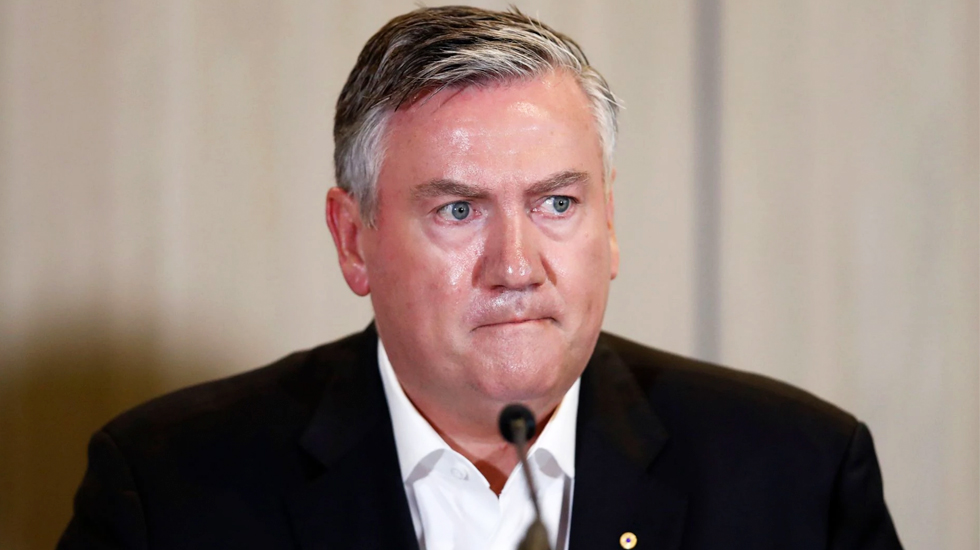
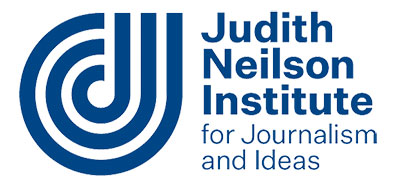
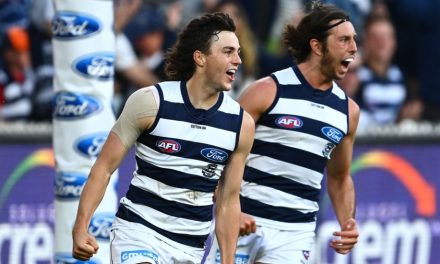
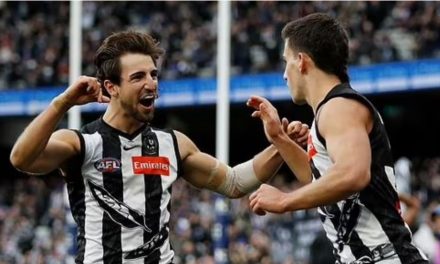
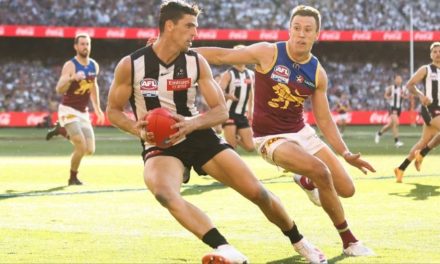
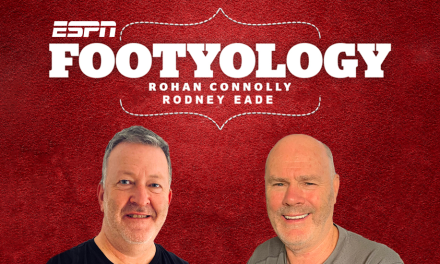


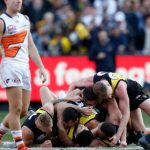



MR. Please email me yr new address. Jk